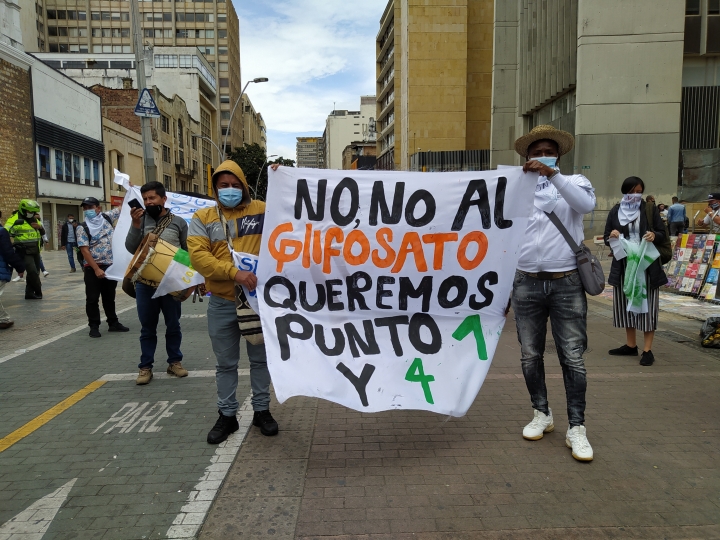Read about the first meeting between the Embassy and civil society organisations here.
Rural reform, reintegration and a solution to the problem of illicit drugs were some of the main points from the Peace Agreement that were addressed during the meeting between more than 20 Colombian organisations, NHRF Colombia and the Royal Norwegian Embassy in Bogota.
During the meeting, representatives from several organisations expressed their concerns and the main challenges of the implementation of the peace agreement. Ximena Quigua, representing the organisation Fundación Comunitar, explained that the results of rural reform is hard to measure. She also commented on the lack of progress in land restitution, as only 8 % of the requests that have been processed have been in favor of victims. Natalia Herrera, from Corporación Jurídica Yira Castro, discussed the difficulties of political participation and victims of the armed conflict. She said that it is one of the points of the agreement with highest level of implementation, but said that there are still many challenges to it. The Colombian Truth Commission (Comisión para el Esclarecimiento de la Verdad, la Convivencia y la No repetición) will present its final report on what happened during the more than 50 years of armed conflict in November this year. When it comes to the reparation for victims, Herrera said that there is little or no progress, and that the main challenge is to incorporate the institutions that existed prior to the Peace Agreement into the new legal framework that emerged after the signing.
The Colombian Truth Commission will present its final report on what happened during the more than 50 years of armed conflict in November this year.
Luis Castillo, from Corporación Jurídica Libertad, expressed the need to continue receiving support from the international community, also taking COVID-19 into account: "Support to victims' organizations need to be flexible due to the pandemic, and the support should be concentrated to peacebuilding organisations". He recommended the international community to approach the Colombian government to ensure the independence of the institutions created after the Peace Agreement, and to promote visits by international organisations.
Elisabeth Moreno, from Consejo Comunitario General del San Juan (ACADESAN), talked about how organisations with Afro-descendants and indigenous communities had participated in the implementation of the agreement, but now feel excluded by the Colombian government. "There is an invisibilisation of organisational processes, social movements and women's movements," she said. In the end, Paola Moreno, representing la Unidad Indígena del Pueblo Awá, highlighted how the situation in the Awá indigenous community worsened after the signing of the Peace Agreement: "The presence of groups fighting for control of the territory have multiplied." This, combined with an increase of threats against persons and also the territory, she calls for accompaniment and better protection of the Awá community.
“The presence of groups fighting for control of the territory have multiplied”. Paola Moreno, la Unidad Indígena del Pueblo Awá
The Norwegian Ambassador to Colombia, John Petter Opdahl, listened to what the organisations expressed about the problems and challenges to implement the Peace Agreement efficiently. "As a guarantor country, supporting the implementation of the Peace Agreement is Norway’s highest priority in Colombia. We are convinced that the work of the Colombian civil society is essential to achieve a lasting peace. They can always count on our support", he said. The NHRF Colombia’s Country Director, Caroline Aarsæther, stressed the importance of these kind of meetings: "The NHRF is incorporating more spaces for analysis that allow us to contribute to the understanding of the context and the different realities and needs of the territories where the organisations work".
“The NHRF is incorporating more spaces for analysis that allow us to contribute to the understanding of the context and the different realities and needs of the territories where the organisations work." Caroline Aarsæther, NHRF Colombia's Country Director
This meeting was made possible thanks to the agreement between the Norwegian Embassy in Colombia and the Norwegian Human Rights Fund (NHRF), helping to support around 50 projects by Colombian civil society organizations working on issues of access to justice and peace, security, protection and guarantees for human rights defenders, and land and environmental rights.
Photo: A march against the use of glyphosate on crops. Photo credit: Corporación Colectivo de Abogados José Alvear Restrepo (CCAJAR).

